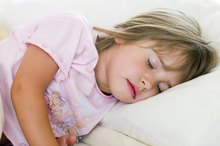Side Effects of Melatonin in Children
Melatonin, found both naturally in the body and in synthetic form, regulates the hormones associated with the body's natural circadian rhythm, an internal clock that controls normal sleep patterns. Synthetic melatonin allows users to reprogram the body to a more natural pattern, especially someone who has had his normal sleep cycles disturbed. Children, especially those suffering from autism and attention deficit/hyperactivity disorder (ADHD), can benefit from the use of melatonin. Drugs.com recommends that parents consult their physician before administering melatonin to children and to consider the potential side effects associated with this over-the-counter supplement.
Fatigue
Fatigue is a symptom that is expected when children take melatonin. The supplement triggers the hormones that control a child's sleep cycle, making the child tired. Manufacturers of melatonin supplements recommend that the medication be administered 30 minutes before bedtime. The Centers for Disease Control and Prevention suggests children should have between 9 and 13 hours of sleep per night to prevent fatigue from settling into daytime activities.
- Fatigue is a symptom that is expected when children take melatonin.
- Manufacturers of melatonin supplements recommend that the medication be administered 30 minutes before bedtime.
Irritability
Can a Kid Take Melatonin With Vyvanse to Help Them Sleep?
Learn More
Irritability may be present in children who take melatonin, especially during the first few weeks. The changes made from prior sleep habits to new, controlled patterns can leave a child cranky and easily irritated. This irritability should subside within a few weeks, as the body's circadian rhythm begins to reset.
Bed-Wetting
Younger children who recently have been toilet trained may begin to have bed-wetting episodes when taking melatonin. When a child has experienced sleep deprivation, the natural changes that melatonin brings to the body allows him to rest and sleep in a deeper state. This deeper state of sleep can prevent him from waking when he needs to urinate. Once a child has adjusted to the new sleep cycle and has recaptured lost hours of sleep, bed-wetting should subside.
- Younger children who recently have been toilet trained may begin to have bed-wetting episodes when taking melatonin.
- When a child has experienced sleep deprivation, the natural changes that melatonin brings to the body allows him to rest and sleep in a deeper state.
Sleepwalking
Melatonin Side Effects in 3-Year-Olds
Learn More
Children may experience sleepwalking episodes while taking melatonin. There is no research to suggest why this occurs, other than it is related to the deep sleep cycle that occurs with melatonin use. The National Institutes of Health notes that this side effect often will cease after a child stops taking the supplement.
Nightmares
Nightmares, also known as night terrors, occur while a child is in a deep sleep. A child's fears and even past events can manifest into these dreams and cause her to wake up afraid and crying. While the use of melatonin allows her to have a better controlled sleep cycle with longer and deeper sleep periods, the deeper sleep, combined with the extended time in this state, can aid in the development of nightmares.
Related Articles
References
- University of Maryland Medical Center: Melatonin
- Buscemi N, Vandermeer B, Hooton N, et al. The efficacy and safety of exogenous melatonin for primary sleep disorders. A meta-analysis. J Gen Intern Med 2005;20:1151-8. doi:10.1111/j.1525-1497.2005.0243.x
- James M, Tremea MO, Jones JS, Krohmer JR. Can melatonin improve adaptation to night shift? Am J Emerg Med 1998;16:367-70. doi:10.1016/s0735-6757(98)90129-2
- Fischer, S., Smolnik, R., Herms, M., Born, J., and Fehm, H. L. Melatonin acutely improves the neuroendocrine architecture of sleep in blind individuals. J Clin Endocrinol.Metab 2003;88(11):5315-5320. doi10.1210/jc.2003-030540
- Gringras P, Gamble C, Jones AP, et al; MENDS Study Group. Melatonin for sleep problems in children with neurodevelopmental disorders: randomised double masked placebo controlled trial. BMJ. 2012 Nov 5;345:e6664. doi10.1136/bmj.e6664
- Jan, J. E., Hamilton, D., Seward, N., Fast, D. K., Freeman, R. D., and Laudon, M. Clinical trials of controlled-release melatonin in children with sleep- wake cycle disorders. J Pineal Res 2000;29(1):34-39.
- Nagtegaal JE, Laurant MW, Kerkhof GA, et al. Effects of melatonin on the quality of life in patients with delayed sleep phase syndrome. J Psychosom Res 2000;48:45-50. doi:10.1016/s0022-3999(99)00075-6
- Natural Standard. "Melatonin" Mayoclinic.com.
- PDRHealth. "Melatonin"
- Rossignol, D. A. and Frye, R. E. Melatonin in autism spectrum disorders: a systematic review and meta-analysis. Dev.Med.Child Neurol. 2011;53(9):783-792. doi:10.1111/j.1469-8749.2011.03980.x
- Sack RL, Brandes RW, Kendall AR, et al. Entrainment of free-running circadian rhythms by melatonin in blind people. N Engl J Med 2000;343:1070-7. doi:10.1056/NEJM200010123431503
Resources
Writer Bio
Educated at the University of Alabama, Lauren McGregory has been writing since 2000. She currently writes for eHow and LIVESTRONG.COM, as well as several private clients. McGregory holds a Master of Science in nursing and currently works in the intensive care unit at the University of Alabama in Birmingham (UAB) Hospital as a registered nurse.









